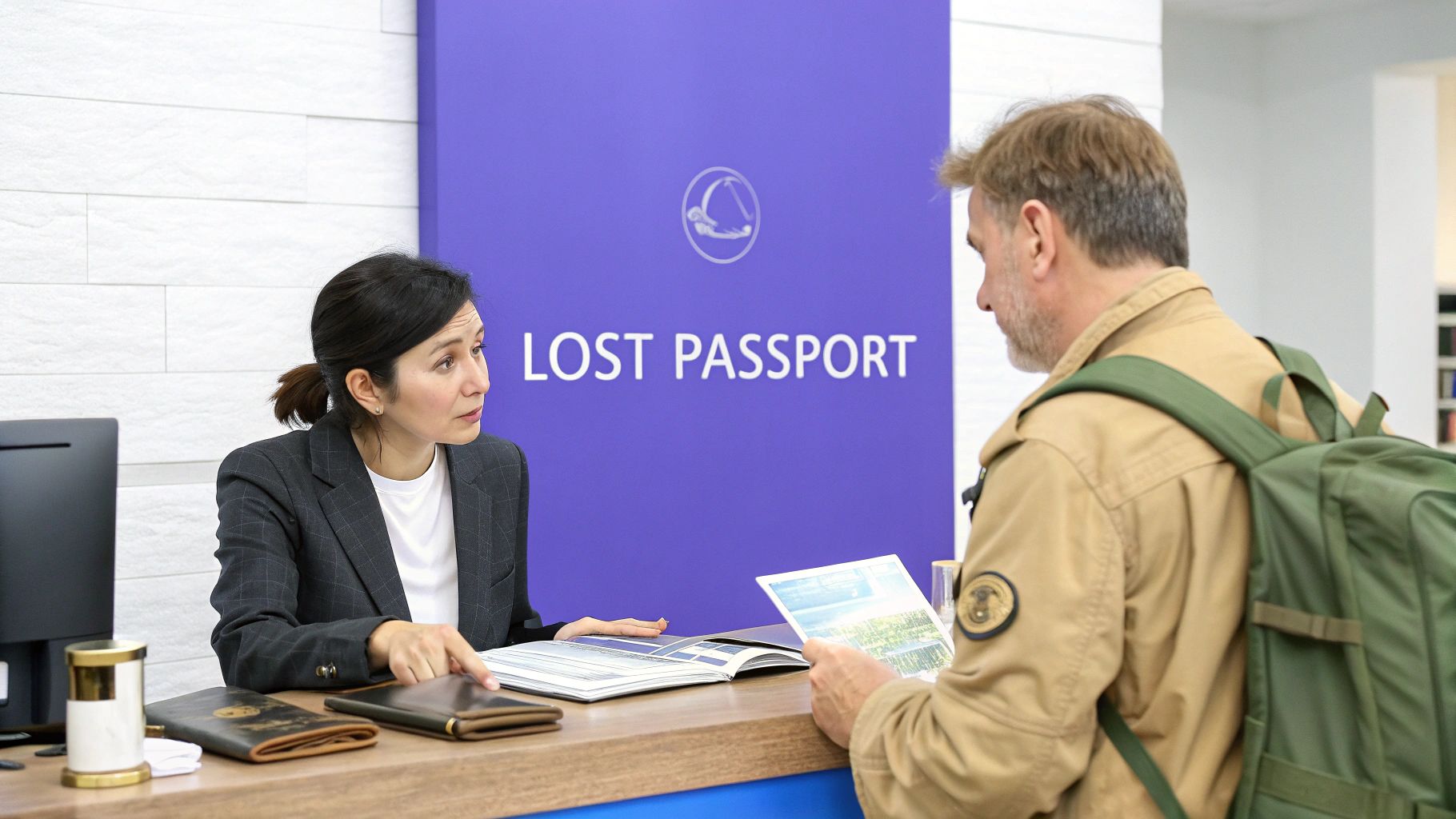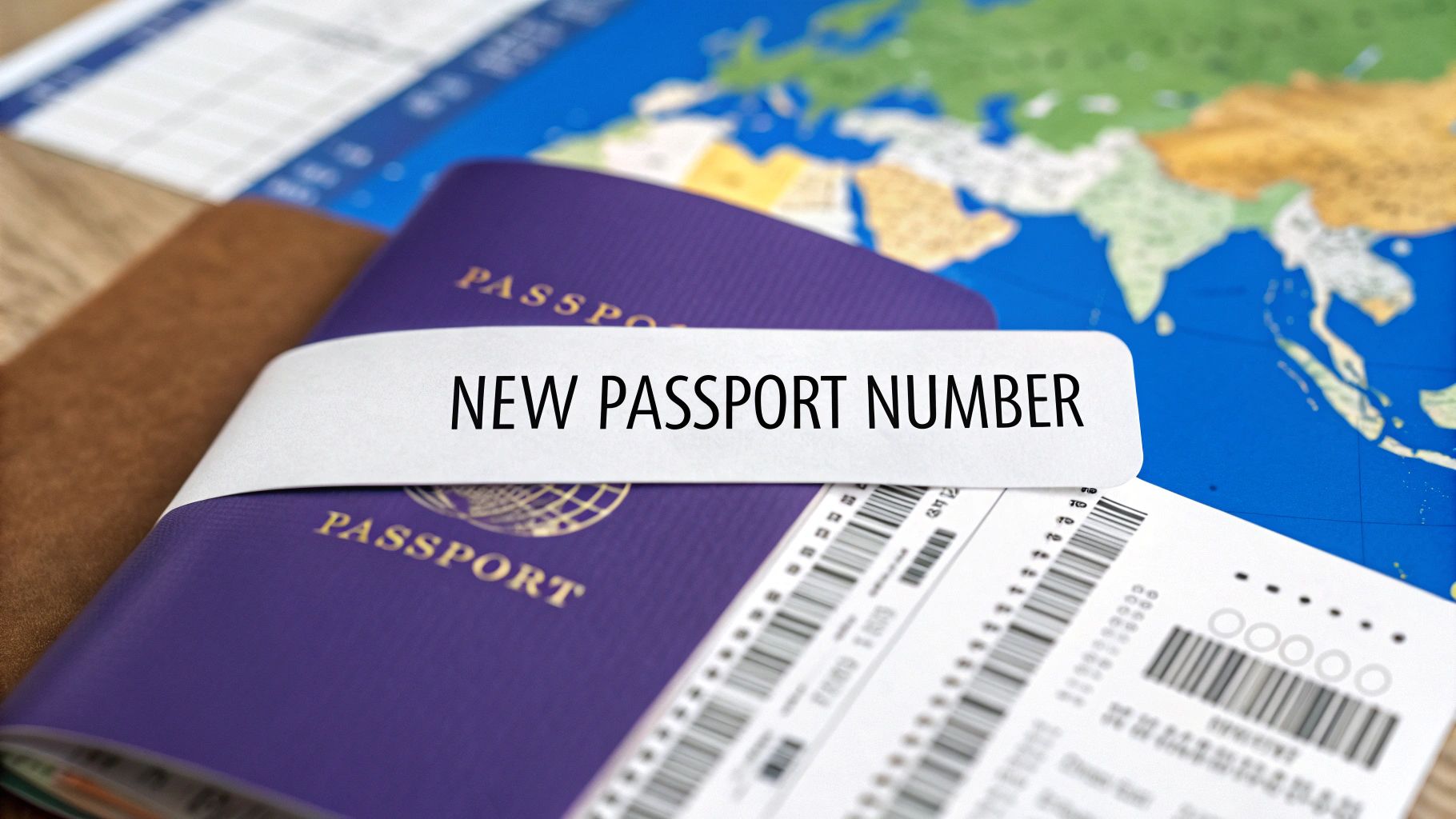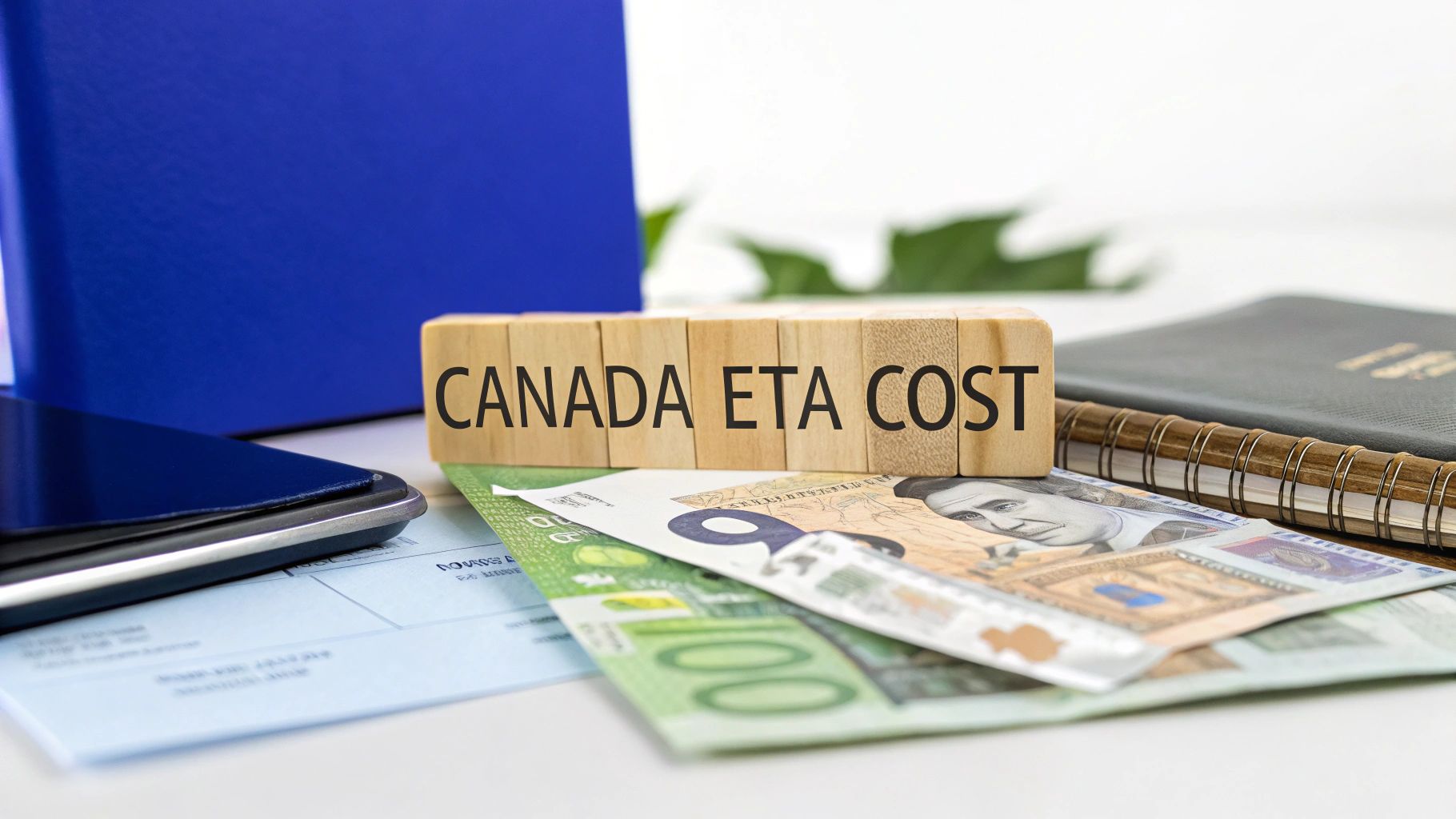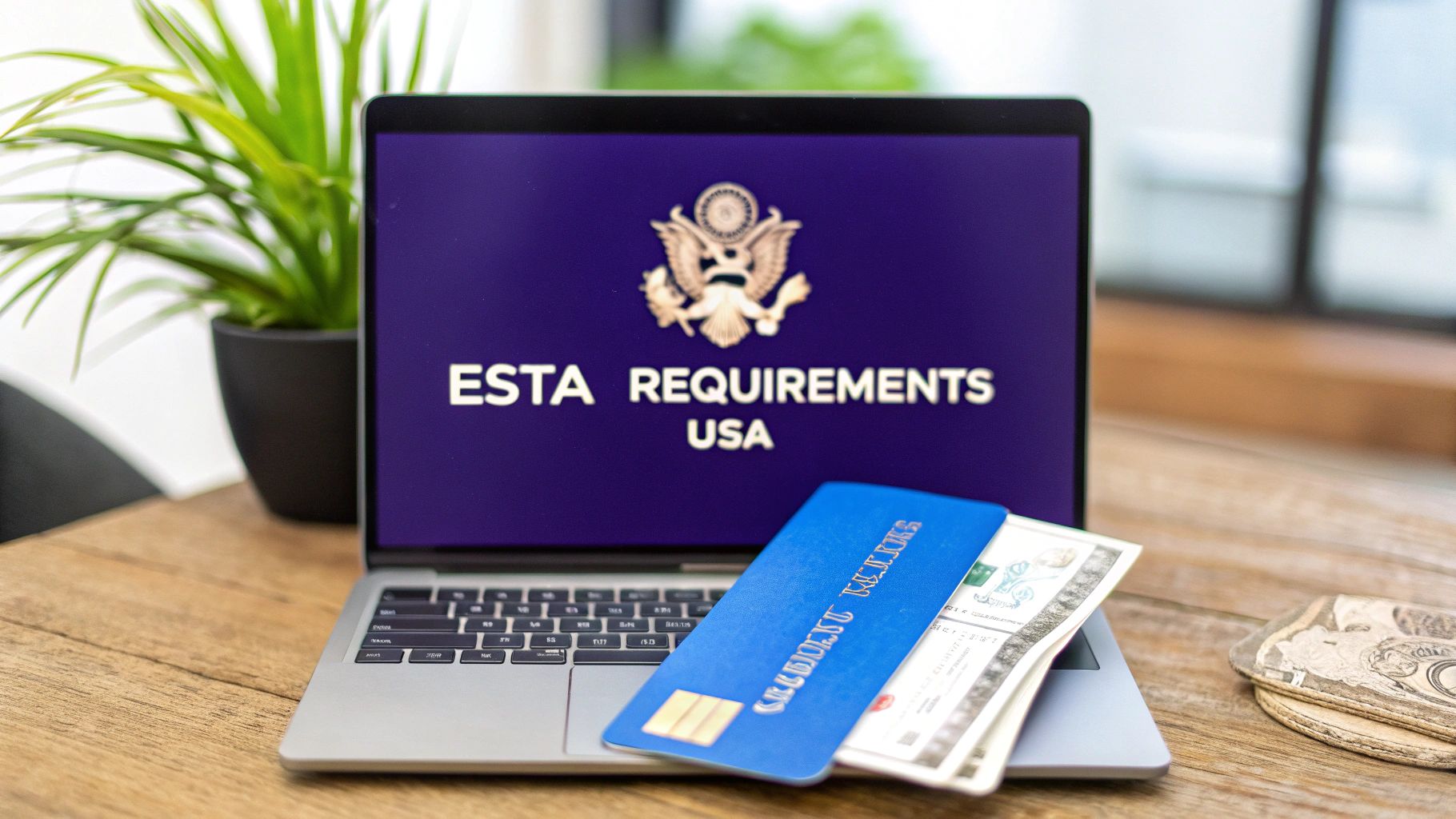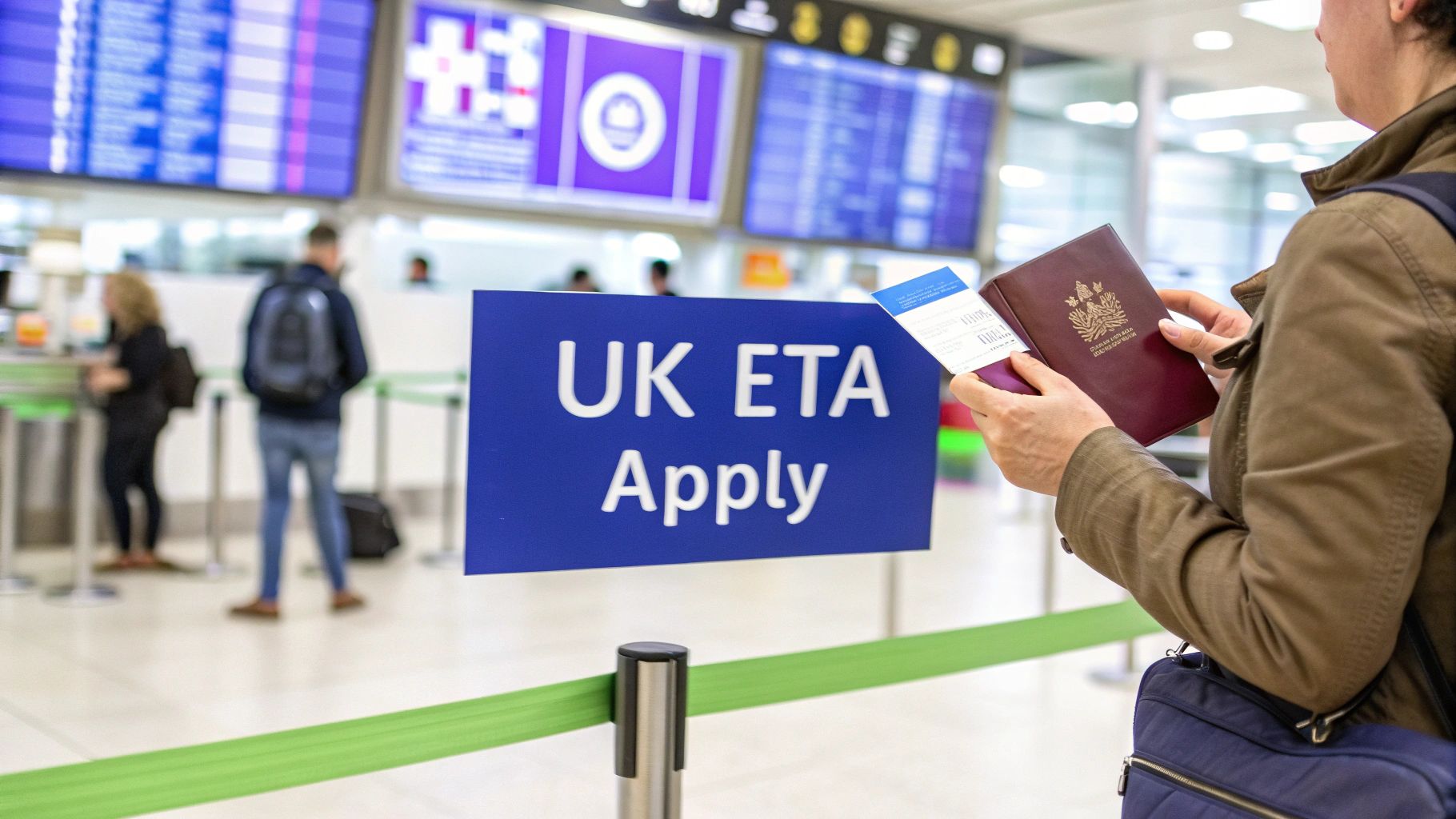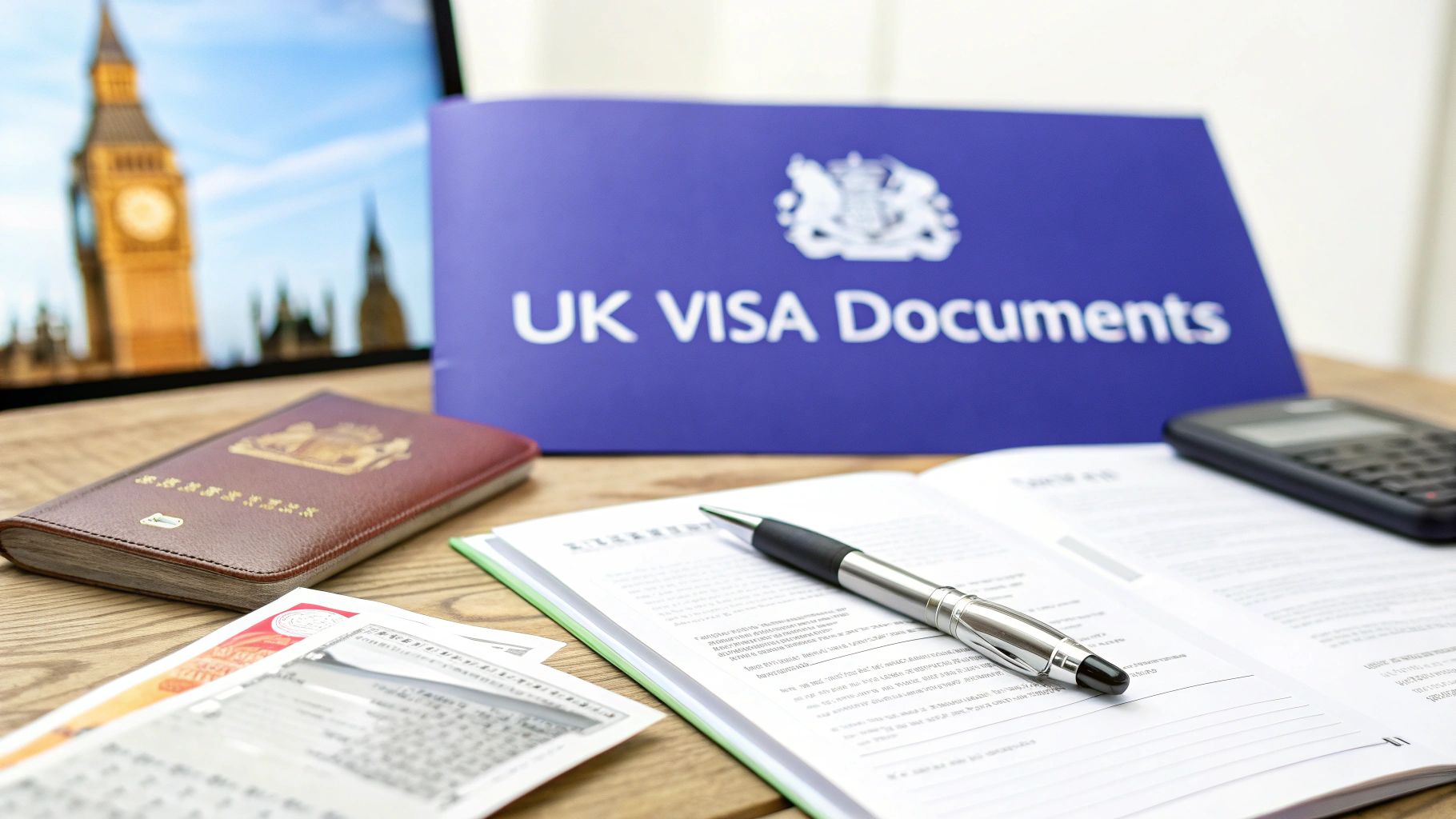
A Guide to UK Visa Documents
Whether you're applying for a UK visa or the newer ETA, you'll need a few key documents. The absolute must-haves are a valid passport, proof you can financially support your trip (proof of funds), and a clear travel itinerary. The modern UK ETA system makes things much simpler for many travelers, but even this digital process requires you to get the details right to avoid any headaches at the border.
Your Essential UK Visa Document Checklist
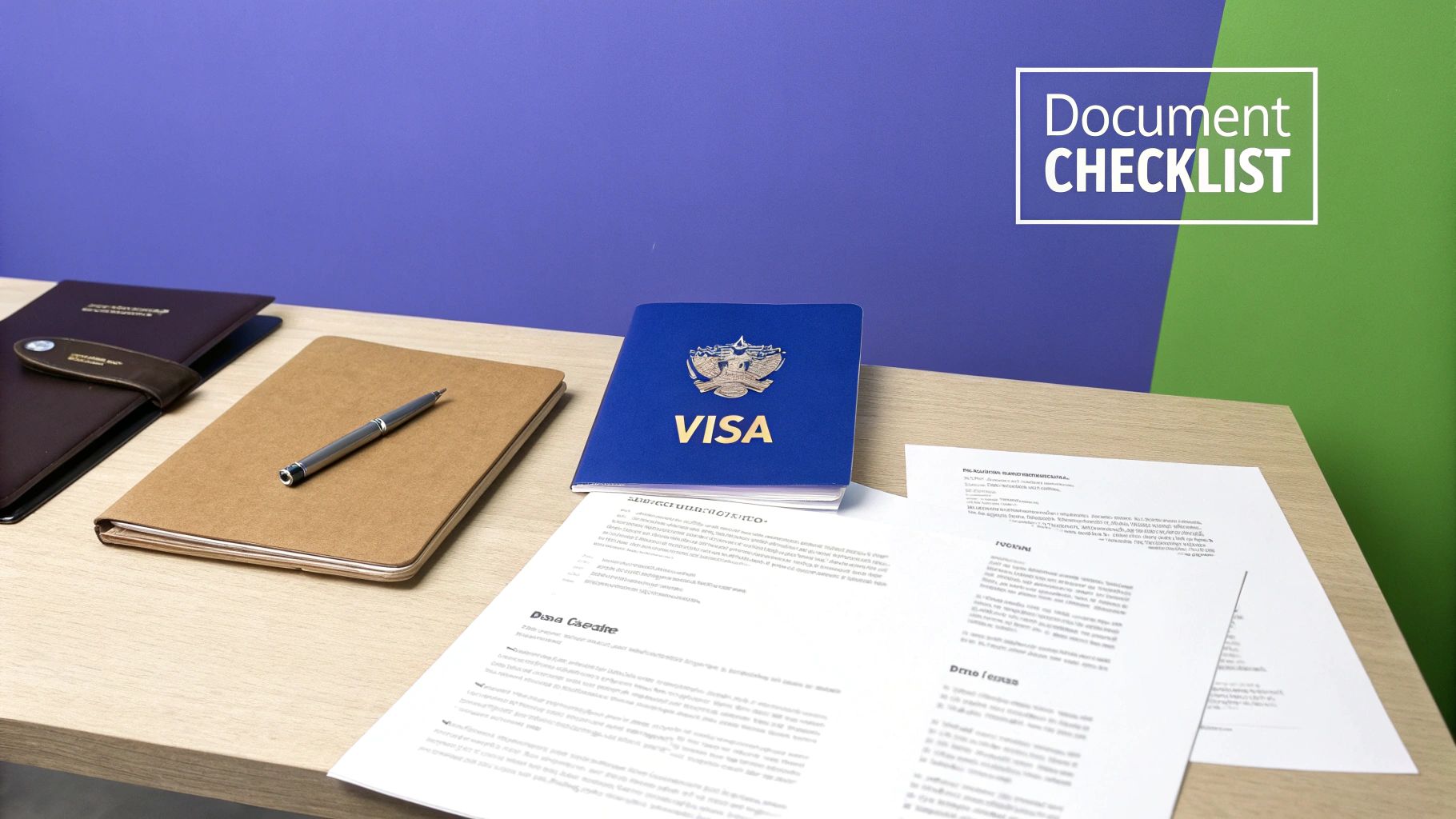
Getting through the UK's entry requirements can sometimes feel like a puzzle. But honestly, it all comes down to one thing: having the right documents ready to go. This guide will walk you through the essential paperwork you'll need, whether you're applying for the new digital UK ETA or a more traditional visa.
It helps to think of your application as telling a story to the UK Home Office. It’s the story of who you are, why you’re visiting, and your plans to return home. Each document you provide is a piece of evidence that makes your story believable.
The Non-Negotiables for Every Applicant
Let's start with the basics that every single applicant needs. These are the documents that confirm your identity, prove you can cover your costs, and show what you plan to do in the UK. Getting these right from the start is the best way to avoid common mistakes that cause frustrating delays or rejections.
Here’s a quick-reference table to keep the core documents straight.
Core Documents for Your UK Travel Application
| Document or Information | What It Proves | Key Details to Verify |
|---|---|---|
| Valid Passport | Your identity and nationality. | It must be valid for your entire stay and have at least one blank page for stamps. |
| Proof of Funds | Your financial ability to support your trip. | Bank statements showing consistent income and savings are the gold standard here. |
| Travel Itinerary | The purpose and duration of your visit. | This includes things like flight bookings, hotel reservations, and a rough schedule of activities. |
| Ties to Home Country | Your intention to leave the UK after your visit. | This could be proof of a job, property ownership, or close family commitments back home. |
This table covers the fundamentals, giving you a clear picture of what UK authorities are looking for and why each piece of information matters.
The Rise of Digital Travel Authorizations
For many travelers coming from visa-exempt countries, the UK's new Electronic Travel Authorisation (ETA) system is a game-changer. It’s a digital pass that makes entry for tourism, short business trips, or transit much smoother. While the UK ETA application is way simpler than a full visa, it still demands total accuracy. Even a tiny typo can put your travel plans at risk.
The UK ETA is a digital permission to travel—it is not a visa. It authorizes a person to travel to the UK, making the process quicker and more secure for millions of visitors each year.
This is exactly why getting a bit of professional help can be so valuable. Government websites can be confusing, and the rules are strict. Even for something as straightforward as the UK ETA application, making sure every single detail is perfect is the key to a stress-free trip. To simplify your ETA application and increase your chances of approval, consider using AssistEntry — their experts guide you through the entire process, starting from just $79. As a trusted third-party application assistance provider, their service includes full verification and error-checking, giving you the peace of mind that your application is in good hands.
Understanding the UK Electronic Travel Authorisation
The UK is rolling out a new digital system to streamline its borders called the Electronic Travel Authorisation (ETA). It's easy to get this mixed up with a full visa, but it’s much simpler. Think of it as a digital permission slip that pre-clears you to travel to the UK.
This new system is for visitors who don’t need a visa for short trips—like holidays, visiting family, quick business meetings, or even just passing through. It's all about making the arrival process smoother and more secure for millions of travelers.
Who Needs a UK ETA?
The ETA is being introduced in phases, with different countries being added to the list over time. It's a must-have for anyone from a visa-exempt country planning a short visit. For instance, travelers from Qatar, Bahrain, Kuwait, Oman, the UAE, Saudi Arabia, and Jordan were some of the first to need an ETA.
Because the list of countries is growing, it's smart to check the official requirements before you book anything. Your reason for visiting also has to fit into one of these categories:
- Tourism: Sightseeing, holidays, or visiting friends and family.
- Business: Popping over for a conference, meeting, or negotiation.
- Short-term Study: Taking a course that lasts up to six months.
- Transit: Catching a connecting flight through a UK airport.
An ETA is a digital pass linked directly to your passport. It gets you on the plane, but the final decision to let you into the country still rests with a Border Force officer when you land. Without a valid ETA, you won't even be allowed to board your flight.
The Digital Application Process
Applying for a UK ETA is done entirely online, and it’s designed to be quick. You won't have to step foot in an embassy or deal with a single piece of paper. You just need a few things ready on your computer or phone.
Here’s what you’ll typically need when you apply for UK ETA online:
- A valid biometric passport from an eligible country.
- A recent digital photo that fits the UK's specific guidelines.
- A working email address where they can send your confirmation.
- Your travel plans, including why you're visiting.
- A credit or debit card to cover the application fee.
The official application might look straightforward, but the system is very picky. A tiny typo in your name, getting one digit wrong in your passport number, or uploading a photo that isn't quite right can lead to delays or even a flat-out refusal. Suddenly, your whole trip is in jeopardy. If you want a deeper dive into how they differ, we break it all down in our guide comparing the ETA and UK visa.
This is where getting a bit of professional help can be a lifesaver. Fiddling with government websites and second-guessing every detail is stressful, and a small slip-up can have big consequences. To avoid delays and mistakes, you can use a third-party application assistance provider like AssistEntry. Their experts go over every single part of your application to make sure it's accurate and compliant before it's submitted. This extra review step dramatically boosts your chances of getting approved quickly and without any fuss. With prices starting from just $79 (it includes the government fee, all costs included), you get peace of mind knowing your application is in good hands.
Building a Strong Foundation with Core Documents
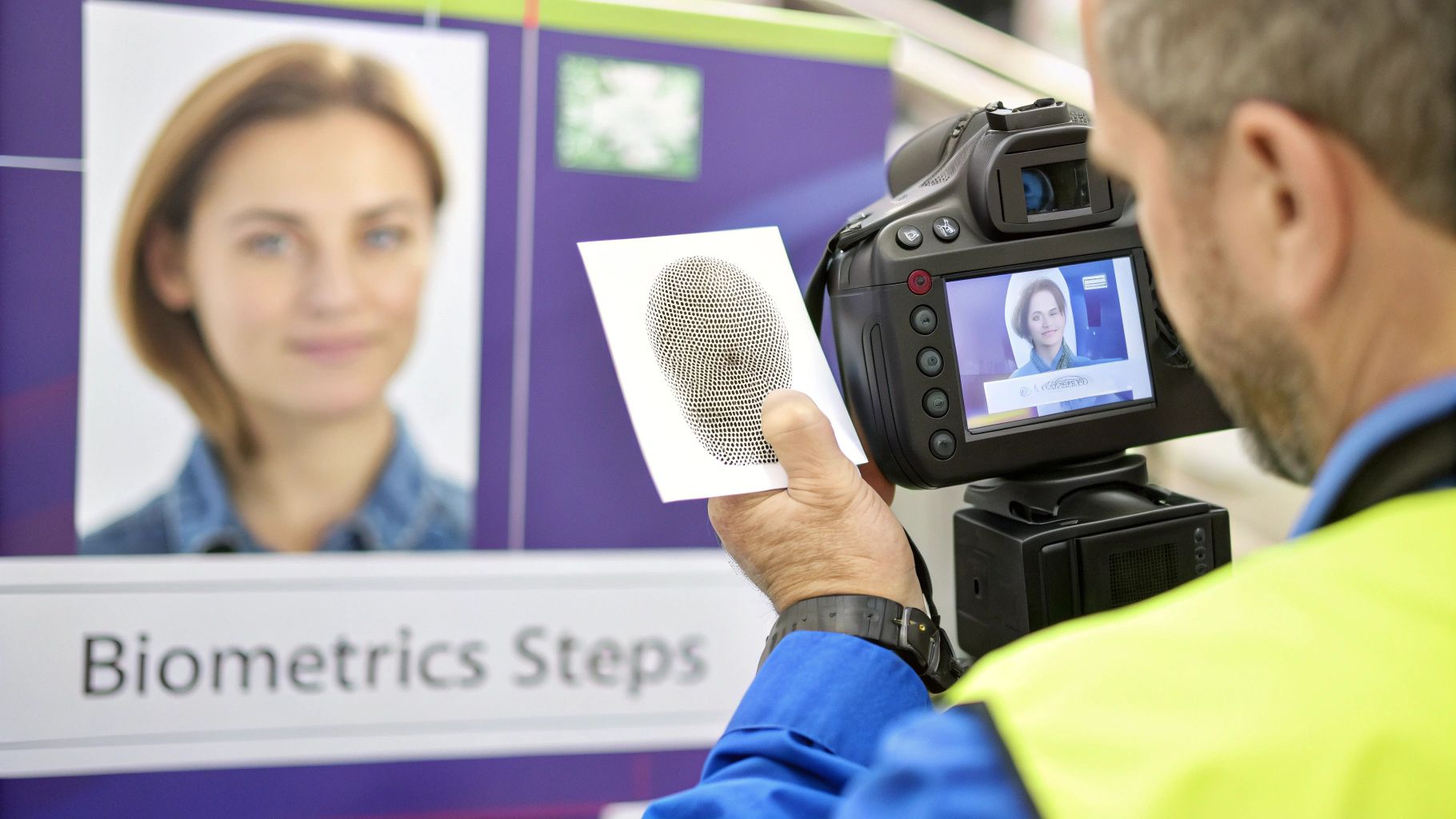
Whether you’re applying for a full UK visa or the new ETA, some documents are simply non-negotiable. Think of them as the foundation of your application—the core pieces of evidence that tell UK immigration officials who you are, that you can support yourself financially, and that you plan to return home.
Getting these basics right from the start is the single most important step you can take. A small mistake here can cause big headaches later, so let's walk through exactly what you need to build a rock-solid case.
Your Passport: The Ultimate ID
This might seem obvious, but your passport is more than just a travel document; it’s your primary proof of identity and nationality. UK authorities are very particular about passport requirements, so this should be your first checkpoint.
- Validity is Key: Your passport must be valid for your entire planned stay in the UK. Don't get caught out by an expiry date that's just around the corner—it’s a classic reason for refusal.
- Blank Pages Matter: You'll need at least one fully blank page. This is where your entry stamp will go if required.
- Condition Counts: A passport with serious damage—like torn pages, a broken binding, or a messed-up photo page—is a red flag and could be rejected.
Proving Financial Stability
The term "proof of funds" can sound intimidating, but it’s really just about showing the UK Home Office you can afford your trip. They need to see that you can cover your expenses without working illegally or needing public assistance.
The best way to do this is with official bank statements, usually from the last three to six months. These should show a steady income and a stable balance that makes it clear your trip is well within your budget.
A strong financial record tells a simple story: you have a stable life to return to and your trip is legitimate. It builds trust and credibility.
Outlining Your Travel and Accommodation Plans
Your travel itinerary gives immigration officials a clear picture of what you plan to do and how long you'll be staying. You don’t need a minute-by-minute schedule, but you do need to show your trip is genuine and well-organized.
Essential Itinerary Documents:
- Flight Confirmations: Always include copies of your round-trip flight bookings.
- Accommodation Proof: This could be hotel reservations, Airbnb confirmations, or even a letter from friends or family if you're staying with them.
- A General Plan: A simple outline of the cities you'll visit or major activities you have planned adds great context.
Putting these documents together proves you have a clear, legitimate reason for visiting the UK. To see how these documents fit into the bigger picture, check out our detailed guide to the UK visa process.
Demonstrating Ties to Your Home Country
This is often the most critical part of any temporary visitor application. You need to prove you have strong reasons to go back home after your trip is over. UK authorities want assurance that you won’t overstay your visa.
These "ties" can be professional, financial, or personal. Good examples include a letter from your employer confirming your job and approved vacation time, documents showing you own property, or proof that you have close family members waiting for you back home.
Think of these documents as your promise to the UK government that your visit is exactly what you say it is: temporary.
Gathering Specific Documents for Your Visa Type
Once you’ve pulled together all the core documents, it’s time to drill down into the specifics of your visa category. Every visa type has its own unique checklist, and this is where the Home Office scrutinizes your reason for coming to the UK. Think of it as moving from the general to the specific—and these details are what make or break an application.
Getting this part right means giving the UK Home Office the exact proof they need for your particular situation. It's no exaggeration to say that missing even a single one of these specific documents is a classic reason for refusal.
Documents for Student Visas
If you're an aspiring student, your application is all about proving two things: you have a genuine spot at a UK institution, and you can afford to be there. The absolute most important document you'll need is your Confirmation of Acceptance for Studies (CAS).
Your university or college issues this unique reference number after you've accepted their offer. It's their way of officially telling the Home Office, "Yes, this person is a legitimate student."
Beyond the CAS, you'll also need:
- Proof of English Language Proficiency: This is typically a certificate from an approved test, like the IELTS for UKVI, unless you qualify for an exemption.
- Academic Qualifications: You’ll need to provide the original certificates or transcripts you used to get the offer from your university.
- Financial Evidence: You have to prove you have enough money to cover your course fees for one academic year, plus your living costs.
This infographic breaks down what it takes to meet the financial requirements for many visa types, including the Student visa.
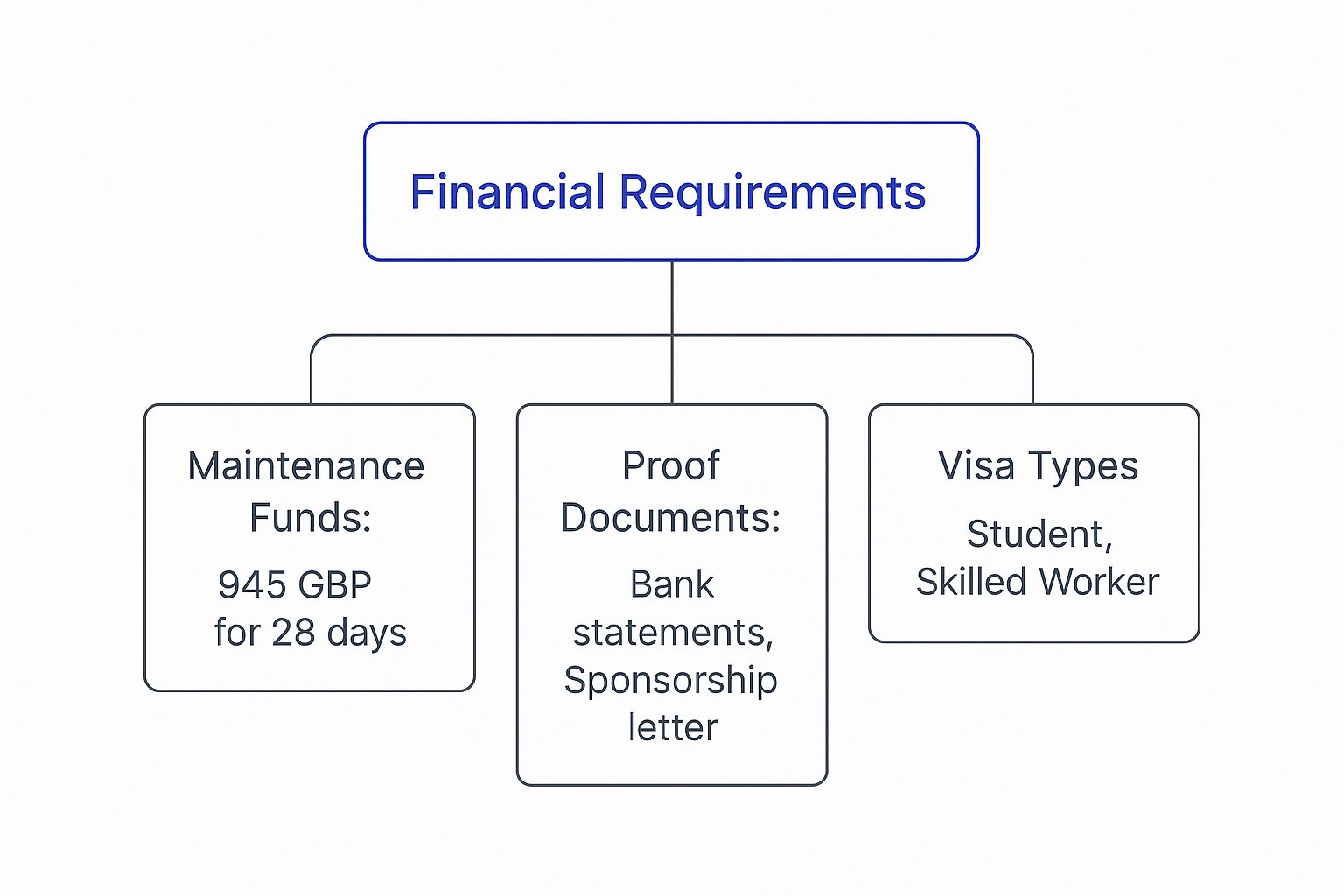
As you can see, proving you have the required funds held for a specific period is a non-negotiable step for many people trying to get a UK visa.
Paperwork for Work Visas
For work visas, like the popular Skilled Worker visa, your evidence needs to prove you have a legitimate job offer from a licensed UK employer. The cornerstone of your application is the Certificate of Sponsorship (CoS).
This is a digital reference number your employer provides, containing all the key information about the job and your personal details. It’s the company’s official stamp of approval, confirming they are sponsoring your visa.
Your Certificate of Sponsorship is your golden ticket. It directly links your application to a specific, eligible job role and a Home Office-approved employer. Without a valid CoS, your work visa application simply can't move forward.
Along with your CoS, you’ll almost certainly have to provide:
- Proof of Qualifications: Any degrees, professional certifications, or other evidence showing you have the skills and experience for the role.
- English Language Skills: Just like students, you must demonstrate you can speak, read, write, and understand English to a certain level.
- Maintenance Funds: You need to show you can support yourself when you first land in the UK, unless your employer has agreed to cover this on your CoS.
The UK's immigration rules are constantly shifting. In fact, recent Home Office statistics showed a 36% drop in work-related visa grants, with Health and Care Worker visas falling by a massive 77%. This just goes to show how critical it is to submit a perfect, compliant application in what's become an incredibly competitive environment.
Evidence for Family and Partner Visas
When it comes to family and partner visas, the focus shifts entirely from professional life to your personal relationships. Here, the Home Office needs to be completely convinced that your relationship is genuine and ongoing.
This calls for a much more personal set of UK visa documents. A marriage or civil partnership certificate alone is nowhere near enough.
You need to paint a full picture of your life together with documents like:
- Communication Records: A selection of emails, text messages, or call logs that show your relationship over time.
- Shared Financials: Things like joint bank statements, utility bills in both names, or a tenancy agreement for a shared home.
- Photographs Together: A collection of photos from different times, places, and events.
- Letters from Friends and Family: Statements from people who can vouch for your relationship.
If you’re just planning a short trip to see family, the document requirements are different but equally important. You can learn more in our detailed guide on the documents needed for a UK Visitor Visa.
How Professional Assistance Simplifies Your Application
Applying for a UK visa or ETA can feel like walking a tightrope. The UK’s systems are famously particular—a single missing document, a tiny typo in your passport number, or a photo that's slightly off-spec can lead to a flat-out refusal. It's stressful, and it can get expensive.
This is exactly why having a third-party expert in your corner can be a game-changer. Instead of wrestling with confusing government websites and dense instruction manuals, you can hand off the heavy lifting to someone who does this all day, every day. It's about trading uncertainty for confidence.
Your Expert Safety Net
Think of an application assistance provider as a seasoned guide on a tricky mountain trail. You could probably find your way on your own, but the guide knows every loose rock, every confusing fork in the path, and the safest route to the top. They're your second pair of eyes, catching the small slip-ups that could send you tumbling back to the start.
Services like AssistEntry live and breathe this stuff. Their team pores over every detail of your UK ETA application, making sure all your information is accurate, complete, and perfectly aligned with the latest UK Home Office rules.
Here’s what that expert check actually looks like:
- Full Verification: They'll cross-check every name, date, and number to make sure they match perfectly across all your documents. No inconsistencies allowed.
- Error-Checking: Typos, transposed digits in your passport number, or simple formatting mistakes are common culprits for rejection. They hunt these down and fix them.
- Compliance Review: They make sure your digital photo ticks all the boxes for the UK's strict guidelines and that your answers confirm you're eligible for the ETA.
Using an expert review service takes the guesswork out of the equation. It turns a high-stress application into a straightforward, professionally managed process, dramatically boosting your odds of getting approved on the first try.
The Value of Peace of Mind
Beyond just spotting errors, professional help gives you something priceless: peace of mind. You can stop worrying about whether you did everything right and start planning the fun parts of your UK trip. The whole process becomes clearer, simpler, and way less intimidating.
For a flat fee starting from just $79—which includes all government costs—you get end-to-end support. No hidden charges, no surprise fees. It's a simple investment in a smooth, successful application.
To simplify your Electronic Travel Authorization for UK and increase your chances of approval, consider using AssistEntry. Their experts guide you through the entire process, removing the guesswork and anxiety.
This kind of support is a lifesaver, especially if you're not comfortable with online forms or just want the assurance that your travel plans are solid. To learn more about how it all works, you can explore our overview of the ETA application process. By letting an expert handle the details, you're not just saving time—you're buying yourself a hassle-free start to your UK adventure.
Common Document Mistakes and How to Avoid Them
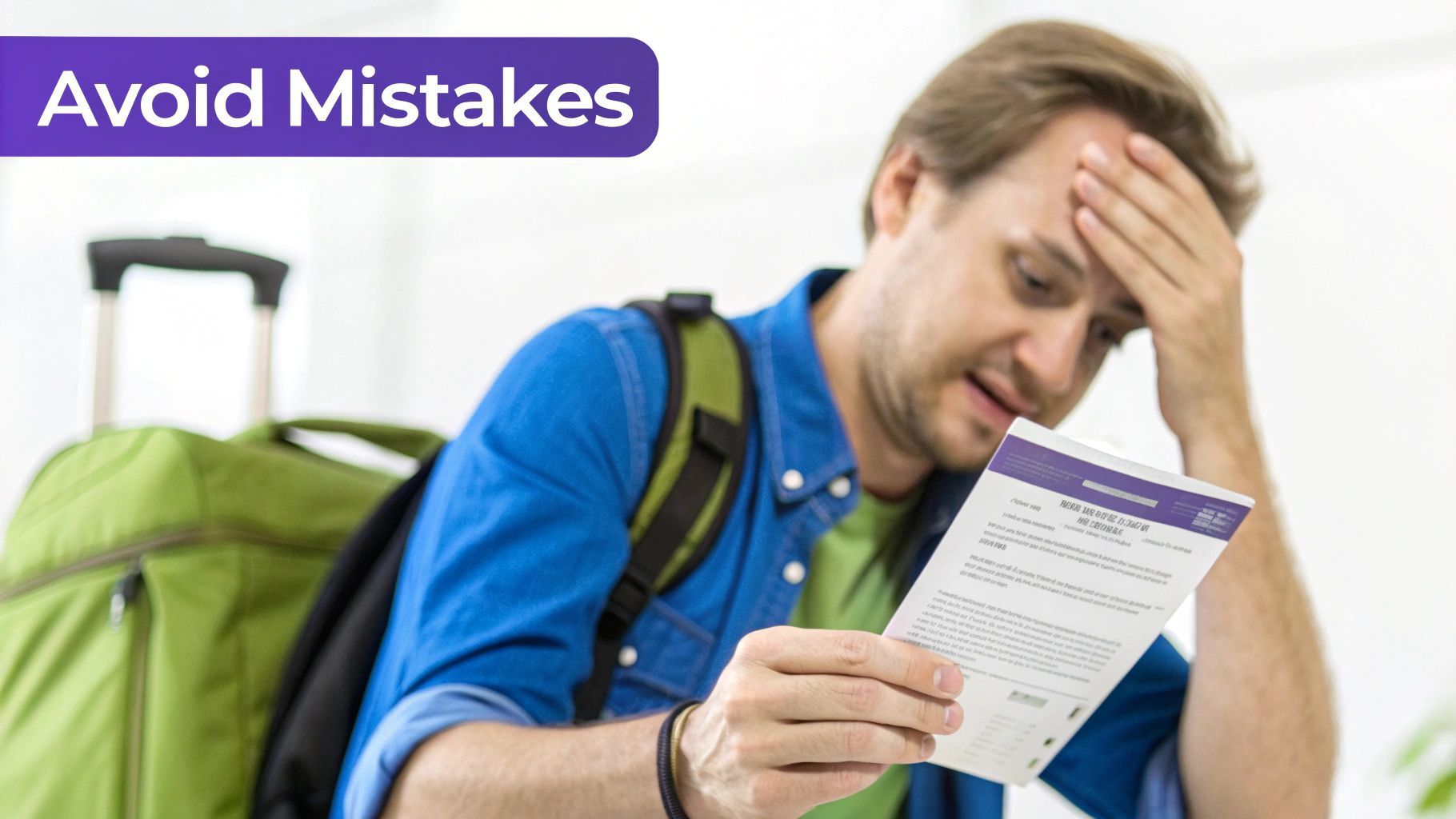
It’s a frustrating truth, but a surprising number of UK visa and ETA applications are turned down for simple, avoidable mistakes. It's rarely about eligibility. More often, it's a small slip-up that causes huge delays and turns your travel plans into a bureaucratic nightmare.
I've seen it all. Applicants submitting passports that are about to expire. Financial documents that don't clearly prove they have the funds. And one of the biggest culprits? Blurry, unreadable document scans. These are instant red flags for immigration officials.
By steering clear of these common pitfalls, you can pull together a polished, professional, and error-free set of UK visa documents that gives you the best shot at a quick approval.
The Critical Role of Consistency
If there’s one golden rule for your application, it's consistency. Every single detail must line up perfectly across all your documents. Your name, date of birth, passport number—everything has to be identical.
Even a tiny mismatch, like a misspelled middle name on a bank statement or the wrong birth year on a letter, can raise doubts. That leads to more scrutiny and, potentially, a flat-out refusal.
- Double-check names: Make sure your full name is spelled exactly the same on the application form, your passport, and every other piece of paper you submit.
- Verify dates: Your date of birth must be consistent across the board. No exceptions.
- Cross-reference numbers: Go over your passport number and other ID figures with a fine-tooth comb to ensure they match perfectly.
Translations and Digital Quality
For international applicants, the language barrier is another common hurdle. Any document that isn't in English or Welsh absolutely must come with a certified translation. This isn’t just a friendly suggestion—it’s a strict requirement.
The translation has to be done by a professional. It needs to include a statement confirming it's accurate, the date it was done, and the translator’s details. Just sending in the original document won't cut it.
Submitting a high-quality, fully compliant application is your first and best opportunity to make a positive impression. An error-free submission demonstrates that you are a serious and well-prepared applicant.
In today's digital-first world, the quality of your scans is just as important. Every uploaded document has to be crisp, clear, and easy to read. A bad scan can cause as many problems as a missing document.
If you do realize you've made a mistake, don't panic. Our guide on how to fix an error on your UK ETA application can walk you through what to do next. Taking a few extra minutes to review everything before you hit ‘submit’ can be the difference between a swift approval and a frustrating delay.
Your Questions Answered
Even with all the prep work, a few questions always pop up when dealing with UK travel rules. Let's clear up some of the most common ones we hear about the UK ETA and visa process so you can feel completely confident.
When’s the Best Time to Apply for a UK ETA?
This is a big one. While the UK ETA application is designed to be quick, our advice is to always apply at least 72 hours before you book your travel.
Think of it as a safety net. This buffer gives you plenty of time to handle any unexpected reviews or processing hiccups. For total peace of mind, a service like AssistEntry can take care of the timing for you. Their experts make sure your application goes in correctly and way ahead of schedule, so there’s zero last-minute stress.
What If My Documents Aren't in English?
If any of your official documents are not in English or Welsh, you'll need to get them professionally translated. It’s not enough to just have a friend do it.
The translation must be certified, which means it needs to include a statement from the translator confirming it's accurate. It also has to list the date, the translator's name, and their contact details. Make sure you attach this certified translation to the original document when you submit it.
Can I Use Digital Copies of My Documents?
Yes, absolutely. For all online applications, including the UK ETA, you’ll be uploading digital copies of your UK visa documents.
The key here is quality. Make sure you're using high-quality scans or clear photos where every detail is legible. Blurry or cut-off documents are a common reason for delays. The accepted formats are usually PDF or JPG, and since the entire ETA process is digital, you won't need to mail any physical paperwork.
Does the AssistEntry Fee Include Government Charges?
It does. The service fee you see at AssistEntry is all-inclusive, which keeps things simple.
When you see prices starting from $79, that single payment covers both the official government application fee and AssistEntry's expert support. That means you're getting a full review of your application, error-checking, and submission management all in one package—no hidden fees, just a smooth, stress-free experience.
Getting your UK ETA requirements right doesn't have to feel like a chore. For a smooth, error-free process, let the experts at AssistEntry handle the details. Their service includes full verification and compliance checks, which significantly increases your chances of approval.
Ready to get started? Head over to AssistEntry’s UK ETA page and apply today.
